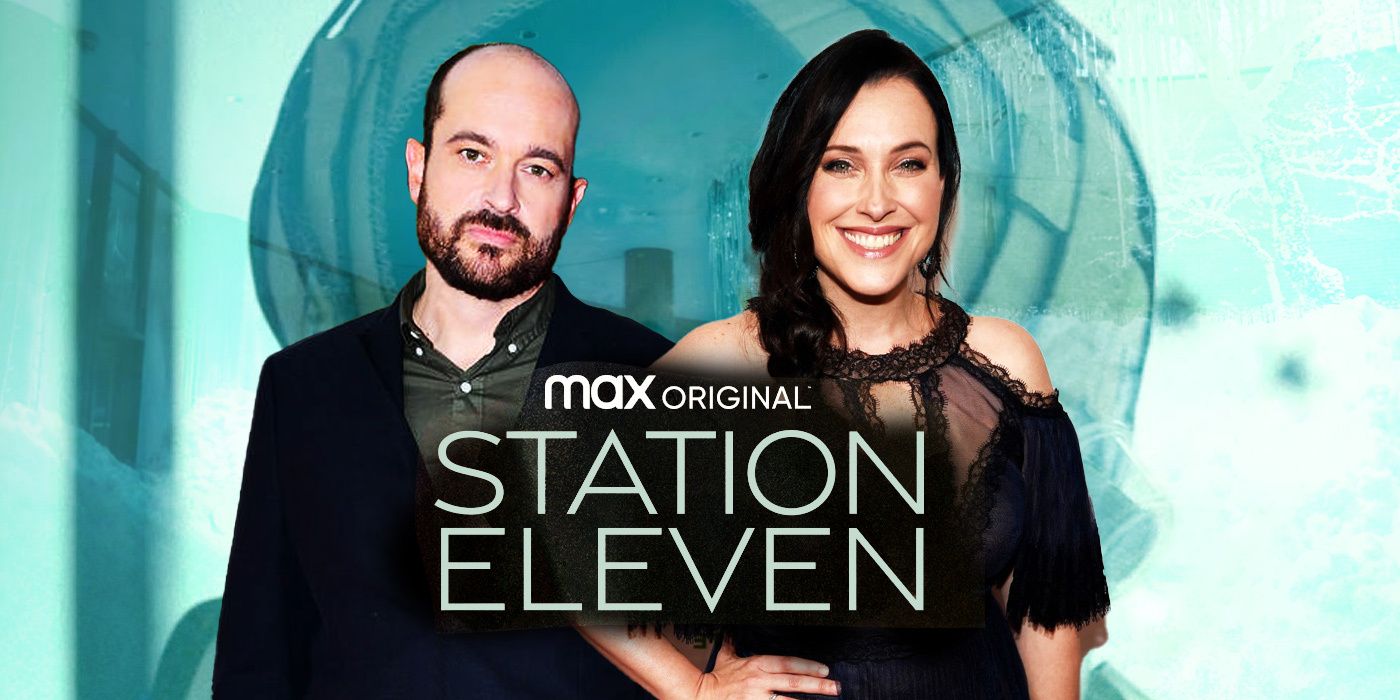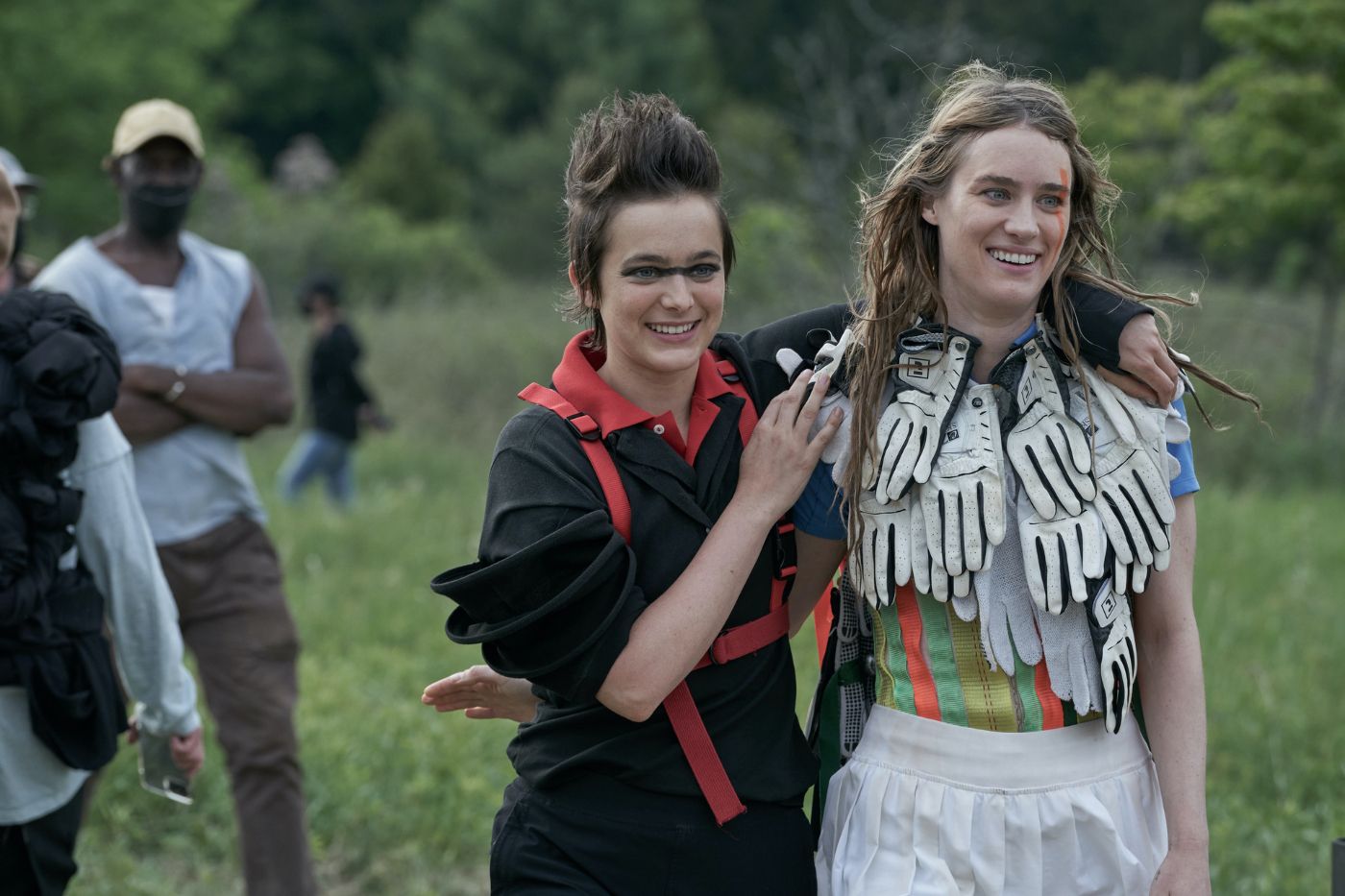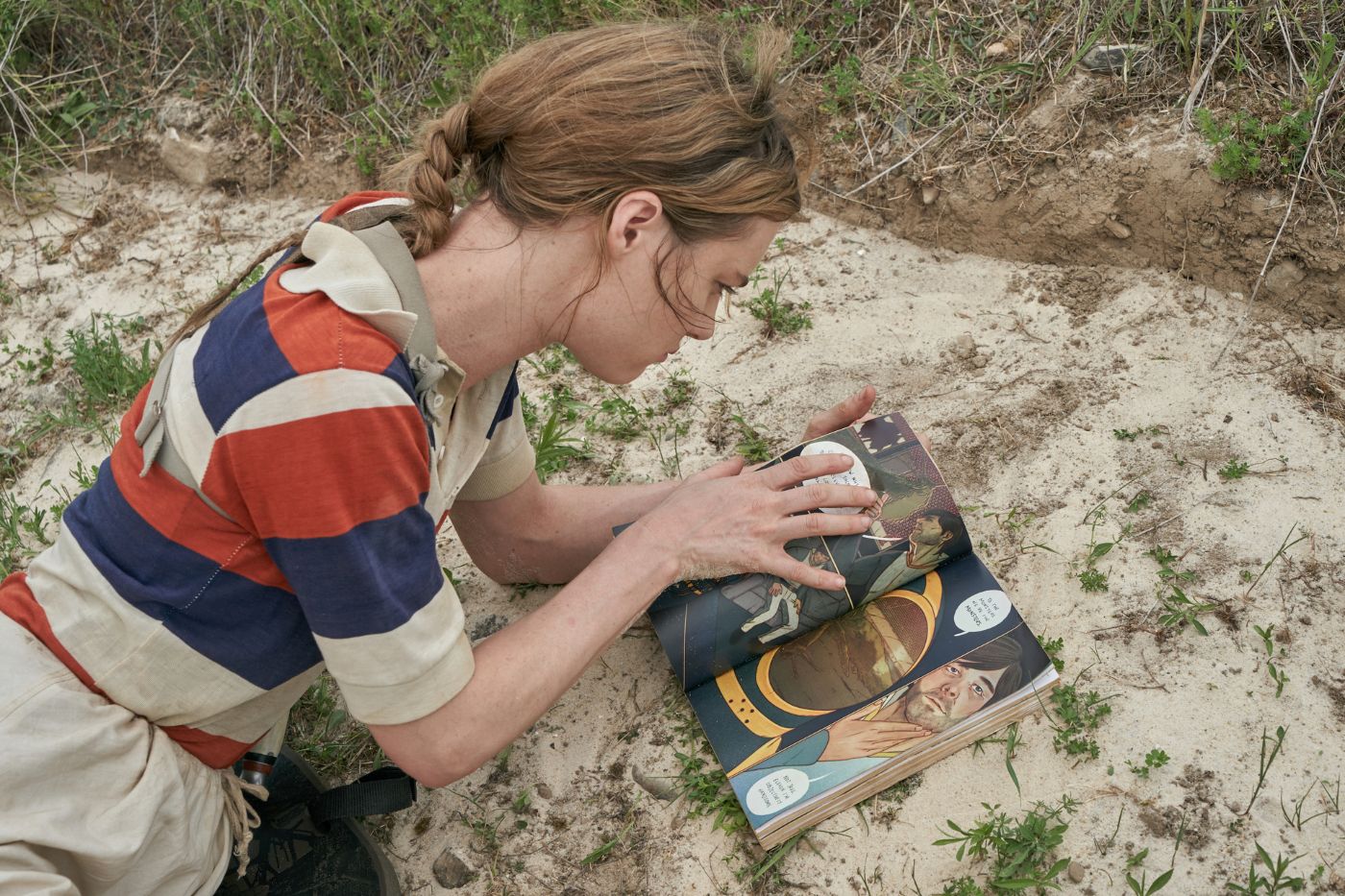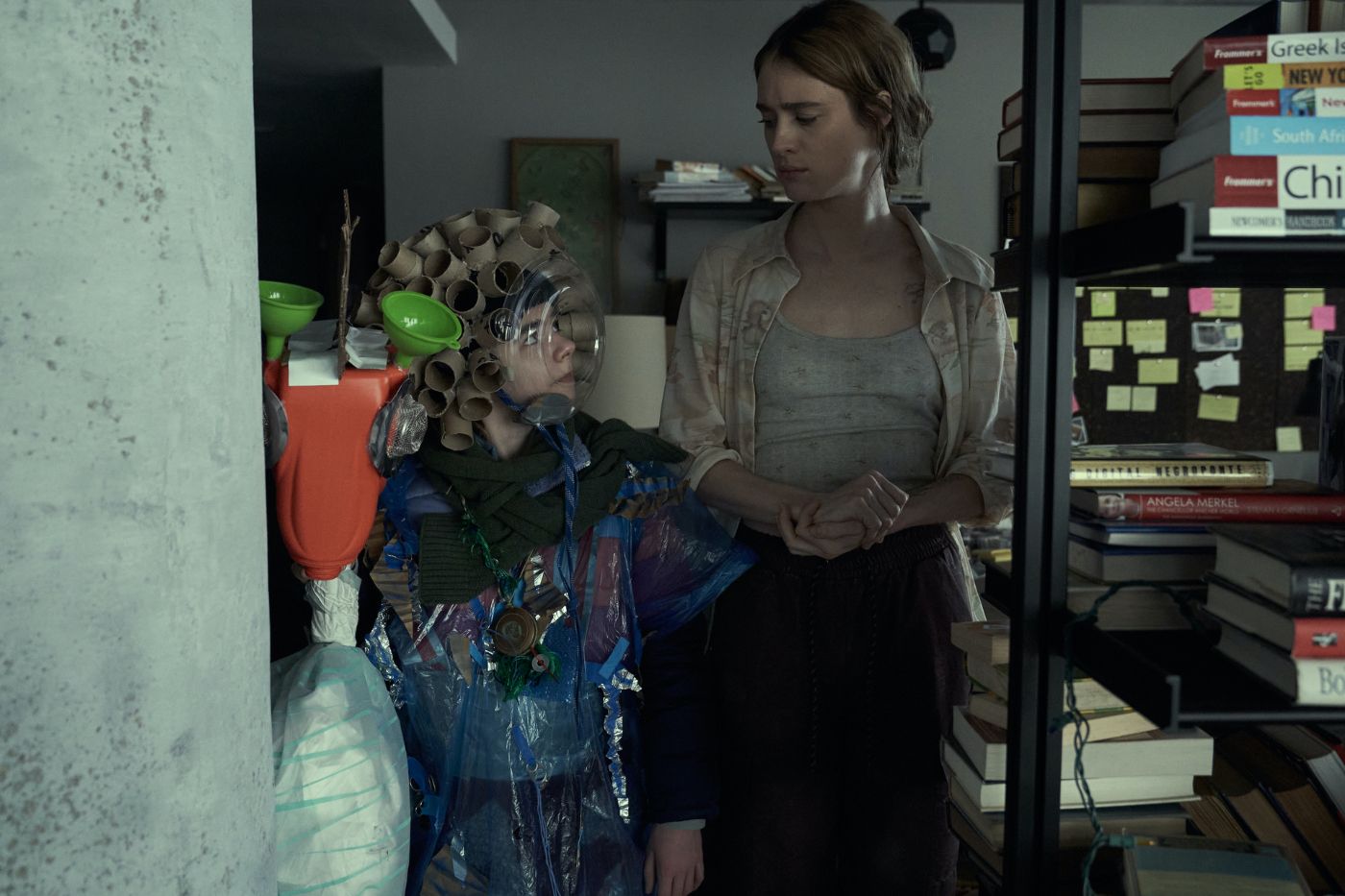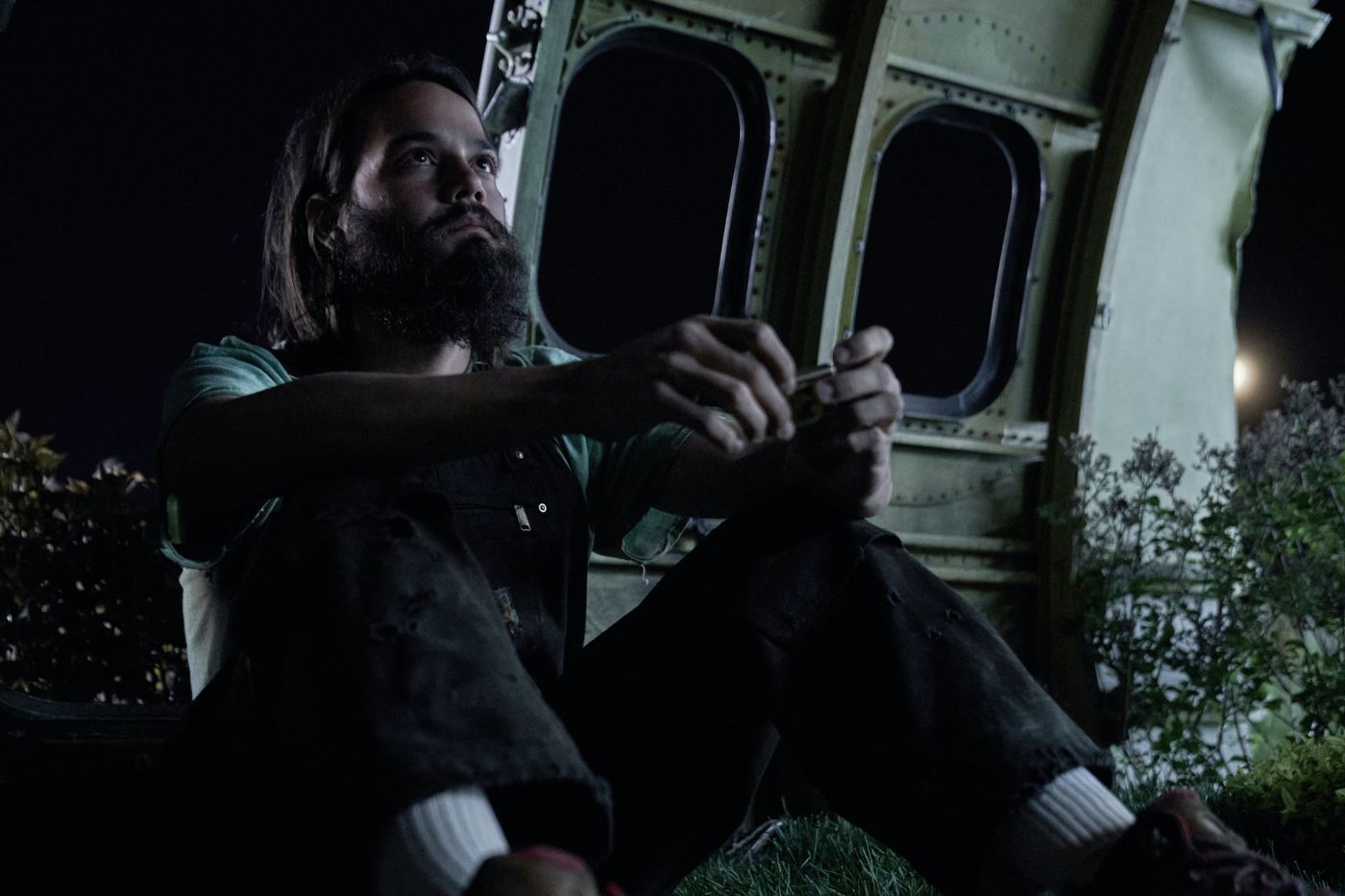Editor's note: The below interview contains spoilers for the entirety of Station Eleven.
The HBO Max miniseries Station Eleven, adapted from the book by Emily St. John Mandel, follows the lives of those who have survived a devastating event: a flu epidemic that directly contributes to the collapse of civilization as they know it. The series, which is created by Patrick Somerville (The Leftovers, Maniac) alternates between past and present timelines to showcase both the pivotal hours leading up to the crisis, the immediate aftermath, and those who have adapted to the new circumstances of their world twenty years later. Technology is mostly a relic of the past, but forms of art — including music and theater — have managed to thrive, and one Shakespearean acting troupe known as the Traveling Symphony ventures from town to town performing for their fellow survivors, but the rise of a cult could also present complications for the group. The sprawling ensemble cast includes both Mackenzie Davis and Matilda Lawler as Kirsten Raymonde at different ages, as well as Himesh Patel as Jeevan Chaudhary, David Wilmot as Clark Thompson, Nabhaan Rizwan as Frank Chaudhary, Daniel Zovatto and Julian Obradors as Tyler Leander, Philippine Velge as Alex, Lori Petty as Sarah, Gael García Bernal as Arthur Leander, Danielle Deadwyler as Miranda Carroll, Caitlin FitzGerald as Elizabeth, and more.
Ahead of the Station Eleven finale, Collider had the opportunity to speak with Somerville alongside Jessica Rhoades, both of whom serve as executive producers, about the HBO Max series. In the extensive interview, which you can read below, they discuss the process of making a pandemic show during a pandemic, the biggest challenge of adapting St. John Mandel's book, finding the right combination of drama and humor, and the visual identity of the series. They also talk about the impact of Episode 7, "Goodbye My Damaged Home" and how it was the first one production returned to after COVID began, the resolution of Tyler's storyline and how it diverges from the book, and whether they'd be willing to return to the world of Station Eleven for a follow-up season.
Collider: The translation from book to screen, or taking anything that's a print medium and trying to translate it for a different format, can always be a little tricky. What was the biggest challenge in terms of adapting the book for the show?
PATRICK SOMERVILLE: To me, the very best thing about the novel, Station Eleven, was Emily's voice as a narrator. The most interesting, artistically, but also the most emotionally attuned and totally pristine, safe, hand-holding you through the end of the world. It emerged from the voice of that novel.
When you do adaptation, you don't get to bring that with you unless you're trying to do something that's inherently a mistake, which is just math one to one, texts, prompts to screen, because then you're losing the tonal changes that are affecting the storytelling. I knew there were many great ideas baked into the novel in terms of visual storytelling, the scale, and the wagons, and the city and the airport. But what I thought the hardest challenge would be was, "How do we recapture that voice and make it back into our storytelling and make it feel like the feeling of reading the book when you watch the show?"
The show always comes back to moments of levity that never keep the plot from getting too bleak, but also simultaneously never undercut the drama of what we're seeing. How did you find the balance between the weight of the story and allowing for those little emotional breathers that we get?
SOMERVILLE: Well, to me, they go hand in hand, I think. No one's going to buy joy if it wasn't hard along the way. And likewise, I have a real problem buying any kind of larger theme about suffering or the inherent problems of the human condition without jokes, because, to me, humor is literally the only way to be able to look at the truth of our situation for any period of time. They go hand in hand. And so to me, just an emotionally true tone owes always two things: storytelling that is not naive, that can imagine as bad of a thing as can be, and storytelling that can wink and be wry about the world. I find myself losing interest in any story that can't do both.
JESSICA RHOADES: We also were making a show about why you'd want to survive, why you'd want to be in this world. What's the point? And the point is art and community, and laughter and joy. That's what you're fighting for. That's what you're losing if you don't get to be here anymore. And so having that be not only the audience experience watching it, but to have the characters living that life that's worth living.
Patrick, you've spoken before about being in production on the show up to a certain point and how a lot of the "before" was shot before COVID. How much of the series had you filmed by that point, and what was it like having to come back and continue production given the reality of the new situation?
SOMERVILLE: We shot two complete episodes in January and February of 2020. And our plan was to go on to hiatus for post and prep and come back in April and May to shoot that summer. And instead, we went down for almost a year. We went down, didn't know our fate, made a lot of tough choices about needing to move the show to Canada, and built a new crew and got on the ground there in the fall, and started shooting again February of 2021.
Two of ten were complete with that chunk in between. And I was still writing in that time, too. And like everyone, I was also sort of changing, I guess. I was in quarantine with my family and kids and feeling the March feeling, and the April feeling, and the May feeling, and the election feeling. So we already were on a line and pointed in a direction and conceptually headed exactly where we wanted to be with the story. I had done a mini-room in February and presented the whole season pitch right before things came undone, and we did what we intended to do. However, and maybe I'll let Jess speak, it was different because of what happened than it would've been, I think, right?
RHOADES: Yeah. I mean, specifically, we had shot [Episodes] 1 and 3 before March. So those characters in those episodes clearly have not survived a pandemic yet. And interestingly, in many of the other episodes, the characters have. And so that impacted obviously the actors, but it, in fact, impacted every member of the crew. Every member of the team coming together brought with them now a sense memory even beyond what Patrick and all the incredible scripts could give to guide them. Everyone now is bringing their own personal experience to the table.
And I think that the first thing we realized as we all reckoned with it [was] what risk are we willing to take to go back, to make the thing we love to do? As producers with the studio... now obviously we were making sure we followed every safety protocol. We were very careful. We made a lot of smart choices, but still as every single human had to do, you made a decision. How am I going to do this? And the show saved a lot of us.
The weirdest thing, the most meta thing about our show was coming together as a crew, as a cast, as a team sitting there on the ground. I remember the day of our first camera test with Mackenzie and Matilda and hearts racing. And we had our masks and we had our shields and all of these people were like, "How are we going to do our job like this?" And then we just started doing our job and the muscle memory of how we did this thing. Because [it was] the first time some of us had genuinely had community again and had all these things. And later into the show, we had live music. It was the first time any of us had live music.
SOMERVILLE: Nabhaan rapping was the first time we'd seen anything in a year.
RHOADES: Matilda singing. Later, Deborah Cox blowing us all away. Everyone except the cameramen stopped doing their jobs. Literally, it was artful.
SOMERVILLE: You were in the show, Jess. Their culture was our culture, but maybe it seems more true that we were characters in Station Eleven a little tiny bit. I don't know. I'm not sure. It was a pretty mystical experience because of how much we needed each other. Usually, when you go to work, it's not your universe in the same way.
In terms of everyone bringing things to the table, the visual identity of the show is so striking and feels in large part due to Hiro Murai's direction and what gets established in that first episode. What kind of ideas did he bring to the table that felt right in terms of defining the show from the beginning?
SOMERVILLE: In Episode 1, Hiro's brilliance, insight was... what we call time drifts, occurred in the episode. And I'm speaking of not just the opening, but the two other moments of sudden, without warning, 20-year jumps with no context whatsoever and then return to our story. Just instant, hyper-objective, almost painfully true glimpses of the future. There were versions of that knit in the script, but Hiro really focused on what I thought became the most elegant, yet brutal, cleanest kind of truth of the show. About how time's not real, I guess, or all things break, or everything's a memory, or everything's a future, a very difficult metaphysical idea, but done in a visual way. And it's scary too, but beautiful.
But in those, Ruth Ammon, our production designer, designed those. That's the dead of winter in Chicago, dressed as a different season. But you can see already the visual palette of Year 20 beginning to emerge there with a lot of azaleas and strange greens. There's a lot of kind of brick reds and what we call lobster bisque red. There's advertisements that are degraded, but still there as the commercial. So all the ideas for the show were kind of put in those pops. And that led to the last moment of the episode, which was actually shot by Helen Shaver, one of our other directors. This is when Mackenzie's lying, splayed out in the sand trap reading Station Eleven. That's Year 20. The amazing thing is, conceptually, we always designed the before to be a compliment to the after, visually. [Cinematographer] Christian Sprenger and Hiro had a big plan about the darkness and tightness of spaces and crowds of the before, the openness, the green, the almost Shangri-La feeling of emptiness and safety and not quite as done, as nature is coming back.
But there's something beautiful about not a destroyed world, but an empty world. And that meant different color palettes, too. So Episode 1 has them both, but like a sprinkle of one and mostly the other, and the same vice versa in Episode 2. But what that meant is that Christian set the color palette for both in that initial episode. And then [cinematographer] Steve Cousens, along with Jeremy Podeswa, the director of Episode 2, then had a template for not just what Year 20 looks like, but the difference between Year Zero and Year 20. Because as you know, we moved through time quite a lot. And so we needed the hearts of the audience, I think. To be able to time travel them, like you're feeling you were in the before or the after to do the work. And so it was vital that we set that up in the first two episodes.
Jessica, you had mentioned coming back to film with Mackenzie and Matilda. I'm wondering if that was Episode 7, which I was going to ask about because I personally love it, but it also feels like a little bit of an outlier for the show with this fever dream. But it's also present and past selves talking, and getting to see Mackenzie and Matilda interacting together in the show. What was the motivation behind putting that story at the point it occurs in the season, and what makes doing an episode like that important to your version of Station Eleven?
RHOADES: Well, I think the funniest thing about that episode is that it was the first episode we filmed [back]. This series was filmed pretty out of order as we needed to... well, production is production. The really interesting thing is that [director] Lucy Tcherniak actually had the cast on that set, coming back to a set they hadn't been to since Hiro wrapped Chicago. And so for Himesh, and for Nabhaan, they really, I think, came back to a space.
SOMERVILLE: Same space. The same apartment that we trucked from one country to another and rebuilt. It was a year later in a different country, but they walked into the same room.
RHOADES: And I think that for Mackenzie and Matilda too, they were having that experience as humans, and as actors. And Mackenzie was with them having just shown up, having not filmed in Chicago, but playing a character who was coming back to visit a space of memory. It really, I think, set a tone for the series. Patrick, you found that idea a little late.
SOMERVILLE: We loved that set so much, we thought we could do a whole episode in it. That's a fun challenge and it would make the episode more like a play. But as we got closer to Canada, and I think we understood Kirsten's arc a little bit more, it actually seems very much like the completion of a thing that had started in Episode 2.
I don't really think [Episode] 7's an outlier. Matilda and Mackenzie are the two leads of Episode 2, also. They are in dialogue with each other. It's a memory, but it felt more and more, as we were understanding what Kirsten's arc was about, that remembering required a certain set of steps, and then confronting and reliving through the eyes of an adult. A thing that maybe happened when you were younger actually can yield new information and change your life and help you heal. And I think it's hard to go back into those rooms, but you can. At some point, you get strong enough to be able to. I think the why now of Station Eleven is this is the year that Kirsten was strong enough to go back into that room. I think she had to, to grow. I think she was stifled and she was stuck, and her radar was a little busted, and her anger had been growing through her twenties. That sounds really familiar to me, honestly, for myself.
We grow up, we get strong enough to finally take a look at the ways that we were traumatized or unfair things got put on our shoulders that we didn't understand at the time. So that's all to say, what Jessica said was profoundly important about how it was the first one we did. Because for Mackenzie, finding her character, she got to acquire the memories that Kirsten had. She literally was standing watching Matilda talking to Himesh and Frank. And that's how I remember my childhood, too. To me, it's not an emotional outlier, but I think of it kind of as a time travel episode, even though it's done in a way that's a little different than most.
RHOADES: I love where [Episode] 7 falls in the season because it's answering the question of what happened in that apartment that is asked at the end of Episode 1. But not in an exploitive way, not in a mystery revealed way. In a true character hadn't explored that yet way. So the audience wasn't ready to, either. And I think that for me, so much as a parent has been teaching my children the difference between stranger danger and knowing whether someone is safe. Like, I think stranger danger is actually a really dangerous concept because a stranger is going to be the person who saves you.
That's the thing, is that a human being that is good is going to be the one that helps you. And so to me, [Episode] 7 is realizing why this child has had this fear of strangers her whole life and remembering that it was a stranger who saved her. That idea changes her perception as she heads into [Episodes] 8, 9, 10, and remembers that you can make a stranger not a stranger very quickly if you aren't defensive or, you know.
SOMERVILLE: If you offer a name.
RHOADES: If you offer a name.
SOMERVILLE: One last thing to throw in, I know we're going on, but [Episode] 7 was a very special experience. To me, there's no worse mystery whose ending is "Here's the awful thing that happened." To me, that's a bad story. The only utility, I think, in a revelation about a past trauma that is worth anything, story-wise, is how it changes what someone does after they reckon with it. And so there's a version of this where we could have found a body in the unmarked grave, basically. It's just bad storytelling to me, but it's also sort of that's where we are right now. We're kind of stuck in that spot with our own pandemic. And so 7 was the right place because Kirsten needed runway to take off as a new human being after that moment.
In terms of dealing with trauma and everything, I can't not talk about the Tyler of it all, and the resolution of his story, which is probably one of the biggest departures from the book. Why did that feel like the right way to conclude his arc for the show?
RHOADES: I sometimes feel like Station Eleven is a prequel to Tyler's launching of a religion. We talk a lot about the fact that his story doesn't end with Station Eleven, and watching the two of them walk away together with Alex really gives you a sense of people who you have come to know, and actually relate to, and understand who they are, find connection. To me, while it's a new beginning for him, like the resolution of Tyler's character is saying, "Come, Mom." And [Elizabeth] saying, "Okay." To me, that's him mending and seeing that people can be... The show to me is about so many children believing very youthful ideas, very black and white, no gray ideas about the world. And the idea that she chooses him, simply chooses him. That she's changed enough as a person, that it's that simple, to me, is so profound in his life that I want to keep... I want to dream of what he dreams next.
SOMERVILLE: Tyler's story will be very different, if we ever tell any more of it, or if this is it. What I mean by that, I guess is, to me, Tyler is not morally clean at all. And I think that neither is Kirsten at that, but I think the show told this part of a story, but I think the deeply cynical person in me... I don't know, this is where institutions come from, that hurt people. People who get their mom back and are healed, mended, it's true. He suffered, he was traumatized and he was mended by that heart. He connected with Kirsten. He was hurt badly. He saved the situation in a lot of ways by being vulnerable, but he is probably responsible for the death of a person a few episodes back, and two children as well. He probably is not keeping these kids safe. I don't know what he would go on to do if he founded a religion, but I don't know that he's equipped to have the power that he has by the end of Episode 10. So if there was more, we would be getting into those matters, I think.
So there is a potential for there to be more. Or you haven't ruled out the possibility of future seasons.
SOMERVILLE: I think if we had the people who are a part of this story, and if we had the right situation, there's more story that could come from this world. But at the same time, it's rare that those things come together, too. So this was a limited series and I don't know, we'll see what happens.
RHOADES: The limited series is very, very satisfying. And it's also true that we can't stop thinking about these characters, and it's possible other people won't either.
All episodes of Station Eleven are now available to stream on HBO Max.

